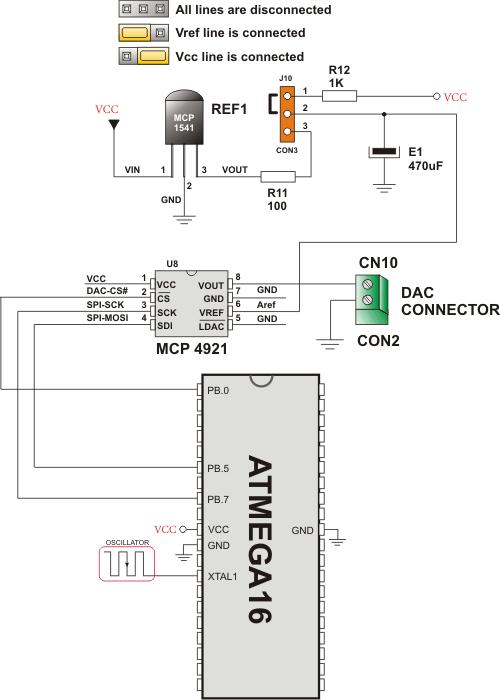SPI Library
mikroC PRO for AVR provides a library for comfortable work with SPI module in Master mode. The AVR MCU can easily communicate with other devices via SPI: A/D converters, D/A converters, MAX7219, LTC1290, etc.
Library Routines
Generic Routines
SPI1_Init
| Prototype |
void SPI1_Init(); // for XMEGA family of MCUsvoid SPIx_Init(); |
|---|---|
| Returns |
Nothing. |
| Description |
This routine configures and enables SPI module with the following settings:
For XMEGA family of MCUs change the X in the routine prototype with C, D, E or F.  Note :
Bear in mind when using MCU's with alternate SPI ports, that this routine will activate standard SPI port. Please, consult the appropriate datasheet. Note :
Bear in mind when using MCU's with alternate SPI ports, that this routine will activate standard SPI port. Please, consult the appropriate datasheet.
|
| Requires |
MCU must have SPI module. |
| Example |
// Initialize the SPI1 module with default settings SPI1_Init(); |
SPI1_Init_Advanced
| Prototype |
// for MCUs without alternate SPI ports void SPI1_Init_Advanced(char mode, char fcy_div, char clock_and_edge); // for MCUs with alternate SPI portsvoid SPI1_Init_Advanced(char mode, char fcy_div, char clock_and_edge, char alt_pinout); // for XMEGA family of MCUsvoid SPIx_Init_Advanced(char mode, char fcy_div, char clock_and_edge); |
||||||||||||||||||||||||||||||||||||||||
|---|---|---|---|---|---|---|---|---|---|---|---|---|---|---|---|---|---|---|---|---|---|---|---|---|---|---|---|---|---|---|---|---|---|---|---|---|---|---|---|---|---|
| Returns |
Nothing. |
||||||||||||||||||||||||||||||||||||||||
| Description |
 Note : Note :
|
||||||||||||||||||||||||||||||||||||||||
| Requires |
MCU must have SPI module. |
||||||||||||||||||||||||||||||||||||||||
| Example |
// Set SPI to the Master Mode, clock = Fosc/32 , clock idle level is high, data sampled on falling edge: SPI1_Init_Advanced(_SPI_MASTER, _SPI_FCY_DIV32, _SPI_CLK_HI_TRAILING); // Set SPI to the Master Mode, clock = Fosc/4 , clock idle level is low, data sampled on rising edge, alternate SPI port selected: SPI1_Init_Advanced(_SPI_MASTER, _SPI_FCY_DIV4, _SPI_CLK_LO_LEADING, _SPI_ALT_PINOUT); |
||||||||||||||||||||||||||||||||||||||||
SPI1_Read
| Prototype |
unsigned short SPI1_Read(unsigned short buffer); // for XMEGA family of MCUsunsigned short SPIx_Read(unsigned short buffer); |
|---|---|
| Returns |
Returns the received data. |
| Description |
Reads one byte from the SPI bus. Parameters :
For XMEGA family of MCUs change the X in the routine prototype with C, D, E or F. |
| Requires |
SPI module must be initialized before using this function. See SPI1_Init and SPI1_Init_Advanced routines. |
| Example |
// read a byte from the SPI bus char take, dummy1; ... take = SPI1_Read(dummy1); |
SPI1_Write
| Prototype |
void SPI1_Write(unsigned short data_); // for XMEGA family of MCUsvoid SPIx_Write(unsigned short data_); |
|---|---|
| Returns |
Nothing. |
| Description |
Writes byte via the SPI bus. Parameters :
For XMEGA family of MCUs change the X in the routine prototype with C, D, E or F. |
| Requires |
SPI module must be initialized before using this function. See SPI1_Init and SPI1_Init_Advanced routines. |
| Example |
// write a byte to the SPI bus char buffer; ... SPI1_Write(buffer); |
SPI_Set_Active
| Prototype |
void SPI_Set_Active(char (*read_ptr)(char), void(*write_ptr)(char)) |
|---|---|
| Returns |
Nothing. |
| Description |
Sets the active SPI module which will be used by the SPI routines. Parameters :
|
| Requires |
Routine is available only for MCUs with multiple SPI modules. Used SPI module must be initialized before using this function. See the SPI1_Init, SPI1_Init_Advanced
|
| Example |
SPI_Set_Active(&SPI2_Read, &SPI2_Write); // Sets the SPI2 module active |
SPI_Read
| Prototype |
unsigned short SPI_Read(unsigned short buffer); |
|---|---|
| Returns |
Returns the received data. |
| Description |
Reads one byte from the SPI bus. This is a generic routine which uses the active SPI module previously activated by the SPI_Set_Active routine. Parameters :
|
| Requires |
SPI module must be initialized before using this function. See SPI1_Init and SPI1_Init_Advanced routines. |
| Example |
// read a byte from the SPI bus char take, dummy1; ... take = SPI_Read(dummy1); |
SPI_Write
| Prototype |
void SPI_Write(unsigned short data_); |
|---|---|
| Returns |
Nothing. |
| Description |
Writes byte via the SPI bus. This is a generic routine which uses the active SPI module previously activated by the SPI_Set_Active routine. Parameters :
|
| Requires |
SPI module must be initialized before using this function. See SPI1_Init and SPI1_Init_Advanced routines. |
| Example |
// write a byte to the SPI bus char buffer; ... SPI_Write(buffer); |
Library Example
The code demonstrates how to use SPI library functions for communication between SPI module of the MCU and Microchip's MCP4921 12-bit D/A converter
// DAC module connections
sbit Chip_Select at PORTB0_bit;
sbit Chip_Select_Direction at DDB0_bit;
// End DAC module connections
unsigned int value;
void InitMain() {
DDA0_bit = 0; // Set PA0 pin as input
DDA1_bit = 0; // Set PA1 pin as input
Chip_Select = 1; // Deselect DAC
Chip_Select_Direction = 1; // Set CS# pin as Output
SPI1_Init(); // Initialize SPI1 module
}
// DAC increments (0..4095) --> output voltage (0..Vref)
void DAC_Output(unsigned int valueDAC) {
char temp;
Chip_Select = 0; // Select DAC chip
// Send High Byte
temp = (valueDAC >> 8) & 0x0F; // Store valueDAC[11..8] to temp[3..0]
temp |= 0x30; // Define DAC setting, see MCP4921 datasheet
SPI1_Write(temp); // Send high byte via SPI
// Send Low Byte
temp = valueDAC; // Store valueDAC[7..0] to temp[7..0]
SPI1_Write(temp); // Send low byte via SPI
Chip_Select = 1; // Deselect DAC chip
}
void main() {
InitMain(); // Perform main initialization
value = 2048; // When program starts, DAC gives
// the output in the mid-range
while (1) { // Endless loop
if ((PINA0_bit) && (value < 4095)) { // If PA0 button is pressed
value++; // increment value
}
else {
if ((PINA1_bit) && (value > 0)) { // If PA1 button is pressed
value--; // decrement value
}
}
DAC_Output(value); // Send value to DAC chip
Delay_ms(1); // Slow down key repeat pace
}
}
HW Connection

SPI HW connection
What do you think about this topic ? Send us feedback!




